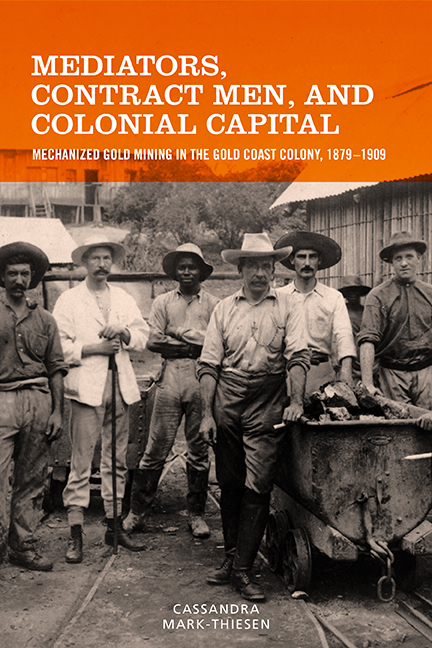 Mediators, Contract Men, and Colonial Capital
Mediators, Contract Men, and Colonial Capital Book contents
- Frontmatter
- Dedication
- Contents
- List of Illustrations
- Acknowledgments
- Introduction
- 1 Prospectors, Politicians, and the Question of “Progress”: The First and Second Gold Booms in Wassa
- 2 Labor Recruitment in the Nineteenth Century: The Place of Practicality
- 3 Disrupted Recruitment at the Turn of the Twentieth Century: Women, Whites, and Other Labor Agents
- 4 Government Strategies for Assisting the Mines
- 5 Labor Agents, Chiefs and Officials, 1905–1909: The Incorporation of the Northern Territories’ Labor Reserve
- Conclusion
- Notes
- Bibliography
- Index
- Frontmatter
- Dedication
- Contents
- List of Illustrations
- Acknowledgments
- Introduction
- 1 Prospectors, Politicians, and the Question of “Progress”: The First and Second Gold Booms in Wassa
- 2 Labor Recruitment in the Nineteenth Century: The Place of Practicality
- 3 Disrupted Recruitment at the Turn of the Twentieth Century: Women, Whites, and Other Labor Agents
- 4 Government Strategies for Assisting the Mines
- 5 Labor Agents, Chiefs and Officials, 1905–1909: The Incorporation of the Northern Territories’ Labor Reserve
- Conclusion
- Notes
- Bibliography
- Index
Summary
This study provides a number of important insights into the global labor history of imperial gold mining in Wassa, as well as in a wider West African context. It has shone a spotlight on West African male and female laborers and labor agents in the mining sector to highlight their contributions to and positions in the socioeconomic and political transformations that touched their societies during the first decades of colonial rule. Capitalist intensification evoked a variety of responses by local actors. We have seen that mining concessions in Wassa relied on a wide variety of labor relations to keep up production, including contract workers, piece workers and tributary workers. This study demonstrates these laborers’ active and creative engagement with casual and contract work, and the related processes. Indigenous labor agents, responsible for bringing groups of contract men to the mines, negotiated much of the politics of labor control for European employers in the mechanized gold mines. Mine managers did not fully dictate the process of limited class formation, either. Many local and migrant laborers also worked out their potential gains and losses, using their bargaining power to develop a work schedule that fit their lifestyles and priorities. The bargaining power of African mine workers in Wassa also helped them to secure regular cash advances, high wage rates, and better treatment by their employers. They employed a variety of political and economic tools to carve out the best possible future for themselves, a future that tended to involve a continued preoccupation with agricultural production. Rarely were they wage slaves, though the coercive power of the mining firms should not be understated.
Mediators, Contract Men, and Colonial Capital takes a more nuanced view of colonial commerce by illustrating the impact of political culture on economic conditions in the Gold Coast. Although the actions of foreign mining entrepreneurs often indicated a strong intention to limit the process of industrialization (especially as it related to restricting workers’ tactics), the labor market was also shaped by their lack of control and limited influence over their new surroundings. In the context of imperial gold mining, mining magnates encountered different socioeconomic and political obstacles in different parts of the globe.
- Type
- Chapter
- Information
- Mediators, Contract Men, and Colonial CapitalMechanized Gold Mining in the Gold Coast Colony, 1879–1909, pp. 158 - 164Publisher: Boydell & BrewerPrint publication year: 2018


